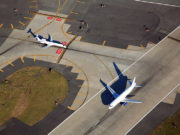I recently participated in a gathering organized by the U.S. National Highway Transportation Safety Administration NHTSA). Administrator Mark Rosekind, who previously served as a member of the National Transportation Safety Board, assembled group of safety people from airlines and automakers to discuss the safety lessons learned in the aviation industry. We heard testimonials about the early days of gathering information on close calls, about the sometimes tense moments when stakeholders came together to discuss ways to improve safety, and about the formation of the U.S. Commercial Aviation Safety Team (CAST).
Since those early days, CAST has done a lot to spearhead voluntary safety enhancements, where the government is NOT involved in pushing legislation and regulation to force improvements. At CAST meetings, government and industry sit side-by-side to look at the biggest risk issues and the associated data and decide together what can be done. Airline safety leaders in the U.S. are pushing for solutions along with the FAA. While voluntary approaches to mitigating risk are getting good results and helping to avoid unnecessary enforcement actions, that doesn’t mean enforcement goes away. Instead of pursuing enforcement actions against all organizations, the FAA continues surveillance work on most organizations but reserves enforcement for organizations that are unwilling to, or incapable of, stepping up to basic safety standards.
So in learning of auto industry resistance to sharing data, I only feel somewhat sad that there is not a level of trust yet. We still see the same thing in the airline industry in some parts of the world, where there is not the healthy level of trust necessary to share information that can lead to safety improvements. Civil aviation authorities in these areas often are seen only as enforcers and not as organizations that can help sift through the data and identify risks in a cooperative manner.
It behooves us all to think about how we can build the arrangements and commitments that can lead to a healthy level of trust so that we can devote our energies to solving safety problems. Our focus should be on complex safety data analysis and avoiding loss of life and not speculation that Big Brother will punish us all. We should concentrte on providing new safety technologies in our vehicles and airplanes rather than believing that no one will be compelled to take action to improve their products without a new regulation.
Mark Millam is vice president, technical, at Flight Safety Foundation.

